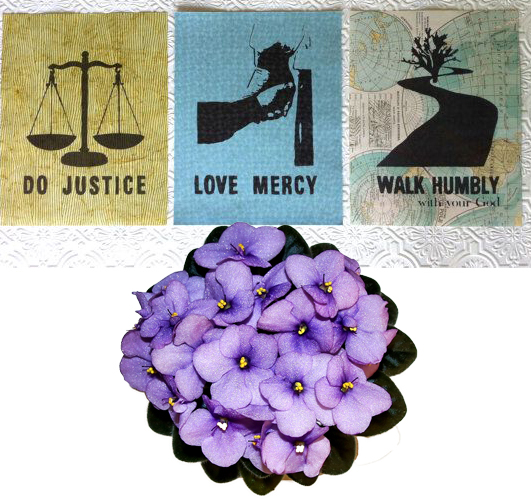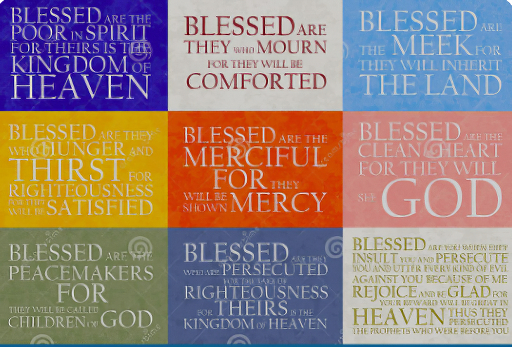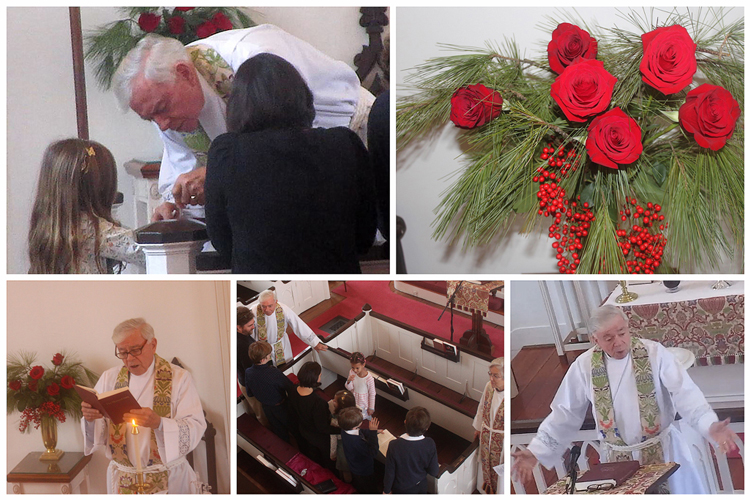I.Theme – The Way of Life – the Beatitutes

The lectionary readings are here or individually:
1. Old Testament – Micah 6:1-8
2. Psalm- Psalm 15
3. Epistle – 1 Corinthians 1:18-31
4. Gospel – Matthew 5:1-12
The readings this week are like a mission statement – what should we do. The setting is important for the Old Testament and the Gospel – the Mountains. That’s traditionally where God is , a place of learning, a place where justice is fostered
The prophet Micah speaks to a people who have been led astray by other gods and by leaders who have failed to look to God’s ways. Micah declares that all of creation is listening; the mountains are acting as a jury in which the people and God come together with their conflict. Micah calls upon the people to set aside the religious practices of the peoples around them, which include giving of the harvest, burnt offerings, even one’s own firstborn child—and instead do what the Lord requires: to do justice, and to love kindness, and to walk humbly with God.
Psalm 15 speaks of those who will abide with God: the ones who practice God’s ways of righteousness and justice, who live out of honesty and give out of their hearts. This psalm is a song of preparation, for those to come before God, they must live into God’s ways.
1 Corinthians 1:18-31 continues Paul’s discourse to the Corinthian church
Proclaiming Christ crucified is the message that should unite the Corinthians—above all else, they follow a Savior who died for them. Corinth is a divided place – it was a diverse group, comprising slaves, freemen, Jews, Greeks, and others.
Paul now wants to show them how their faith distinguishes them from others, or how their faith has changed their orientation within their own tribe or family. For Paul it is all about knowing – “how do we know God, how to we apprehend God?” Paul surmises that the Jews have knowledge about God through the Law, and that the Greeks attempt to know God through philosophical dialogues. Into this sophisticated world, Paul inserts an embarrassing and even upsetting notion – that the cross (stumbling block and foolishness) is the real wisdom of God.
The focus this week will be on the Beatitudes. Here Jesus is teaching the disciples like a rabbi. Jesus is like the new Moses standing on a new Sinai (The Sermon on the Mount), announcing a new set of values for the Reign of Heaven. The text below is from Progressive Involvement
“These beatitudes introduce the Sermon on the Mount, which is the first major speech, of five, in Matthew’s gospel.
“Our text follows immediately upon a summary statement of Jesus’ ministry in chapter 4: “And (Jesus) was going about in all of Galilee, teaching in their synagogues, and proclaiming the good news of the kingdom, healing all disease and all sickness in the people.” (4:23) This unabashed good news is called the gospel.
“The Beatitudes which follow are not, themselves, the gospel. In Lutheran terms, they are “law.” They tell us what we ought to do.
“Setting the stage: Note the formality of the language. Jesus “saw” the crowds, and goes up “into” the mountain. Mountains are places of special events and proclamations in Matthew’s gospel. The mention of the mountain is a signal that something special is about to happen
“His disciples “came to him,” says Matthew . It appears, therefore, that Jesus was primarily instructing the disciples, but doing so within ear-shot of the crowds.
” Jesus is teaching about the “reign of God,” which is not, incidentally, solely about life in heaven. The “reign of God” is meant for the here-and-now as well as in heaven. This is what we pray for in the Lord’s Prayer: “…thy kingdom come on earth as it is in heaven…
” Beatitudes were not a new thing in the world of Jesus. Usually, they were common sense sayings that expressed what everyone already knew.
” As he will do often in Matthew’s gospel, Jesus turns conventional wisdom upside down. Nobody would have associated blessings with being poor or in grief, then or now. In the reign of God, however, God’s favor is upon those who have been left behind–the little, the lone, the least, and the lost.
” These marginalized ones–the poor, lost, and bereft–constituted the major constituency of Jesus. He addressed his message primarily to them. They found his message of God’s favor to be empowering and uplifting.
“Blessed”?: The Greek word we translate as “blessed” is makarioi. Makarioi refers to God’s favor. It could also be translated as “honored.”
” There are nine beatitudes in Matthew–two groups of four, followed by a final one. The first four beatitudes speak to the victims of injustice, those in poverty, grief, the meek, and those with a deep desire for justice.
1 “Blessed are the poor in spirit, for theirs is the kingdom of heaven”
” Matthew’s emphasis seems more to be on those who understand themselves as being in solidarity with the destitute. Such people would likely have constituted an overwhelming majority of the listening crowds.
” People in the time of Jesus were regularly forced off their land, and many–perhaps as many as 15-20% of the population–would have been destitute. They lived in the hills or in shadows, and got by, after a fashion, by forsaging off the land or robbing. Falling into the ranks of the ptochos was a very real fear for the great majority of people. In addition to the large homeless population, another 60-70% of the people stood in real danger of being forced to join them.
2 “Blessed are those who mourn, for they will be comforted.”
” One way to become destitute in the first century was to lose one’s place in their family. Family identity was exceptionally important in the ancient world. People were known as the “son of” or “daughter of” their father and mother.
” One could be reduced to be destitute and resort to begging was through loss of land or loss of family. Family could be lost through the death of one’s parents–hence, “blessed are those who mourn”–or through being cast out of the family.
- “ Blessed are the meek, for they will inherit the earth.”
” Loss of land and loss of family would make a person “meek.” Either one represented loss of status. This was especially important in a society where status revolved around honor and shame. Loss of land and/or family could move a person from an honored place in society to a shameful one–from high social standing within the context of one’s village to social ostracism.
Blessed are the poor in spirit, those who mourn and those who are meek. Blessed are those, in other words, who are down-and-out, rejected, destitute, without a home. They have honor with God. They are not despised and rejected. They are lifted up, held in high esteem, blessed by God. This is called “preferential option for the poor.”
- “Blessed are those who hunger and thirst for righteousness, for they will be filled.”
” These first three “makarisms” are underlined by the fourth: “Blessed are those who hunger and thirst for justice”–dikaiosunane. Matthew chose the words “hunger” and “thirst” with a purpose–they recall those who genuinely did hunger and thirst–and then turned these words in the direction not only of food and drink, but also justice. Blessed are those who yearn–who hunger–for a world where all are honored and none are shamed.
If the first four “makarisms” are for those who lack justice, the next four “makarisms” are for those who work for justice. They promise reward at the end of time for those who live into the reign of God now–the merciful, the pure in heart, the peacemakers, and (again) the persecuted.
- “Blessed are the merciful, for they will receive mercy.”
” Mercy has a wide range of meaning, everything from forgiving sins to healing the sick. “Active compassion” would be another way to put it. The merciful are not only sorry at the suffering of others, but actively try to alleviate it.
” The followers of Jesus are able to show mercy not because of their inherent goodness, but rather because they have been shown mercy. Mercy is an attitude of God, which God’s people reflect into the world.
- “Blessed are the pure in heart, for they will see God.”
“Pure in heart” is about the center of a person being “cleansed” from the old way of living. Katharoi is where we get our modern-day psychiatric term “catharsis.” Catharsis is about purging the old to make way for the new. The “pure in heart” are “cleaned up,” in other words, from heirarchy and support of what Walter Wink calls “the domination system.” Their paradigm gets shifted, their worldview reset.
- “Blessed are the peacemakers, for they will be called children of God.”
” The “peacemakers” are those who bring God’s shalom into expression in the world. This is in marked contrast to the supposed “peacemakers” of the day, the Roman Army. As J.D. Crossan has argued, Rome believed in “peace through victory.” Rome brought peace to the world by defeating her enemies. When Octavian defeated Mark Antony and Cleopatra, he ended the Roman Civil War and was acclaimed a “peacemaker.” The early Christians, however, believed in “peace through justice”–peace through righting wrongs and treating all people, particularly the bereft, with dignity.
- “Blessed are those who are persecuted for righteousness’ sake, for theirs is the kingdom of heaven.”
” The eighth beatitude closes this second pair of four with the same promise extended to the “poor in spirit” in the first beatitude. Those who are persecuted for the cause of justice, like the “poor in spirit,” receive the kingdom of heaven. The verb is a perfect participle which indicates a past action with ongoing effects in the present. The cause of justice has been and is going on.
- “Blessed are you when people revile you and persecute you and utter all kinds of evil against you falsely on my account. Rejoice and be glad, for your reward is great in heaven, for in the same way they persecuted the prophets who were before you.”
” This eighth beatitude, with its theme of persecution, transitions to the ninth. Here, though, Jesus shifts from the third person to the second person–not “blessed are they” this time, but “blessed are you.” This word is at least partly for the people of Matthew’s church who had, indeed, suffered at least some persecution for following Jesus. (Luke has persecuted “on account of the son of man.” Matthew changes this to persecuted “on my account,” thus underlining the close link between Jesus and the disciple.)
” Those who suffer for the cause of Jesus are to “rejoice and be exceedingly glad” for their reward is great in heaven. They are the unfortunate victims of persecution, yes, but they are in a line with the great prophets of the past as well as John the Baptist and Jesus himself.”
 Rembrandt returned to the subject, "Presentation of Jesus in the Temple" at least 5 times from 1627 to 1654, two paintings, three etchings.
Rembrandt returned to the subject, "Presentation of Jesus in the Temple" at least 5 times from 1627 to 1654, two paintings, three etchings.



